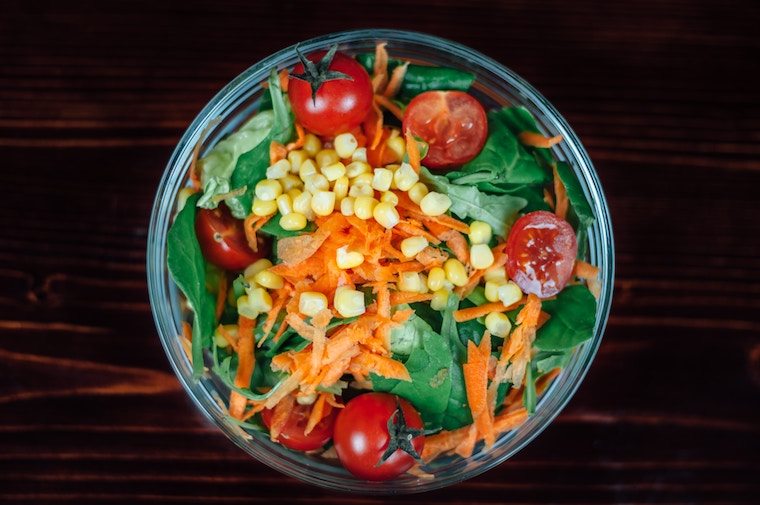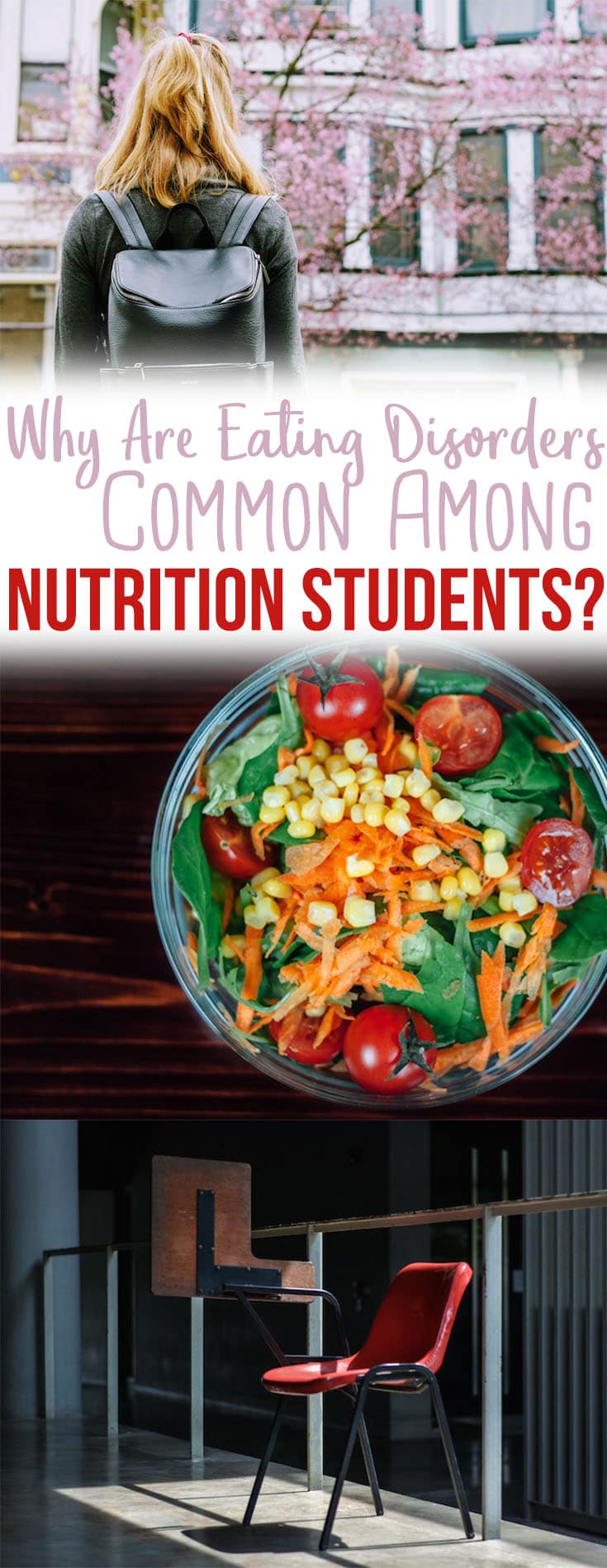We discuss why nutrition students are at higher risk of developing an eating disorder like anorexia, orthorexia and bulimia.
It’s an exciting time to enter the field of dietetics. You can’t go a whole day without hearing something related to food and nutrition. We are definitely in the era where people care deeply about what they eat, and to be able to work in this field has become a huge attraction to many young adults entering college for the first time. With all of its benefits and opportunities, there is, however, a dark side to studying nutrition and dietetics. Namely, the surprising high number of cases of disordered eating. Now, this isn’t news to the research community. We have a huge body of knowledge that suggests there is a higher prevalence of eating disorders among nutrition students compared to any other students. The link may be well known, but the reason as to why that’s the case has not yet been readily asked or even understood.
Let’s first look at the research and then explore some reasons as to why this is happening.
A 2012 international study that encompassed fourteen countries found that 77 per cent of nutrition students felt that eating disorders were a concern among their peers. These studies not only tell us that this issue is not only home grown but is having a huge impact on a global scale.
Binge Eating
Let’s rewind at bit back to an early study conducted in 1992 by Reinstein et al. This study found that students taking dietetic and food science courses scored higher in behaviours related to binge eating compared to students from other non-nutrition majors. This evidence was later confirmed by another study conducted in 2015 that found that there were higher binge eating tendencies among nutrition majors compared to students from other courses.
Dietary Restraint
In 2010, Korinth et al. looked at nutrition students from German universities. The study found that nutrition students, compared to other students, tended to restrict their food intake to control their weight. They did not find any significant data that showed nutrition students had more disturbed or disordered eating patterns compared to other students. Another 2015 study found that female nutrition students had higher eating restraint compared to non-nutrition students. A study by Kinzl et al. back in 2006, echoed these findings, where they reported high levels of dietary restraint in more than 40% of female dietitians. A study conducted in Portugal in 2013 did not find any significant differences in eating behaviour between dietetic nutrition students and non-nutrition students, however they did find that nutrition students tended to restrict their food intake to control their weight compared to non-nutrition students. Even though they did not find differences, they still concluded that dietetic/nutrition students showed “a doubled prevalence of psychological and behavioural characteristics often associated with eating disorder when compared to students from other degrees”. These characteristics may prove problematic down the road, as they are continually exposed to nutrition information during their schooling.
Orthorexia Nervosa
I’ve discussed at great length my own personal struggle with orthorexia here, and it seems to be a common disorder among nutrition students, nutritionists and dietitians in the field. Orthorexia is a fixation on healthy food and is expressed qualitatively and not quantitatively like anorexia nervosa or bulimia nervosa. In this 2006 study, within a sample of 283 dietitians, 13 (4.6%) reported having anorexia nervosa, 10 (3.5%) bulimia nervosa and 3 (1.1%) a binge eating disorder in the past. Among that same sample, 99 (34.9%) reported having some orthorectic behaviour and 36 (12.8%) reported having orthorexia. The study found that orthorectic dietitians experienced any kind of eating disorder in the past more frequently than their non-orthorectic colleagues. This however was not a statistically significant result. So, what does orthorectic behaviour look like?
Here’s how orthorectic behaviour was described by dietitians:
25 (8.8%) dietitians gained a heightened sense of self-esteem from eating healthy food
13 (4.6 %) felt guilt or self-loathing when straying from their diet
7 (2.5%) avoided eating away from home for fear of eating unhealthy food
7 (2.5%) avoided eating with other people
3 (1.1%) took their own food along when eating away from home
Year of Study
There is an interesting result that many studies touched on and that is that among nutrition students, there was a significant difference between the seniority levels in the program. In the 2010 study by Korinth et al., they found that over the course of their studies in nutrition, students started to adopt more healthy food choices and their tendency to be obsessive over their eating behaviour decreased. This was also seen in the 1992 study, which found that junior and senior dietetic majors had more positive eating habits compared to their freshmen dietetic cohort. Authors suggest this may be because of their increased exposure to nutrition information. However, many would also argue that over time, this constant exposure to food and nutrition information may do more harm than good.
Let’s explore some reasons why.
Entering the College Phase
Whether you’re studying nutrition or not, entering college for the first time can be a difficult transition for many young adults. No parental surveillance and more or less freedom on what, when and how to eat. This new environment puts young adults in a vulnerable position for developing an eating disorder. A review by Hoek et al. (2003) found that the average prevalence rate for anorexia nervosa among young females was 0.3%. For bulimia nervosa 1%. Probably not the most surprising, but women are at much higher risk of developing an eating disorder (3.2%) compared to men (1.2%).
Conflicting Nutrition Information
Many would argue that the course content in a nutrition degree can create confusion and a ton of conflicting information. When I entered my nutrition program, eggs were bad, and then once I graduated from my nutrition program, eggs were good. Throughout our education, we’re constantly exposed to conflicting ideas about food, weight and even what the ideal of ‘health’ looks like. For some individuals, this may create paranoia and distrust which can put a lot of pressure on their food choices. Let’s not forget about the abundant amount of influence from the diet industry that has shaped us early on in life. That constant stream of information from social media to being exposed to an overload of nutrition information on a daily basis can be a bad combination for some.
Picture Perfect Health
Many of us feel pressure when making food choices. Whether were out with friends or even at a family dinner, our food choices are greatly influenced by those around us. So, imagine a nutrition student, who is supposed to have the answer to good health. I bet you’re watching how they eat. That’s a huge amount of pressure on nutrition students. They feel the need to look the part and are heavily judged by those around them. When we enter dietetics, the public assumes we represent the perfect picture of health. To the outside world, we’re expected to look thin and be fit.
In a review, studies showed that many nutrition students felt there was an image associated with their success as a dietitian. And that image was thin. We also see this expectation in social media – there’s a world of health and fitness gurus that we look up to because they look good, but like anything in social media, we’re only seeing a fraction of the real story.
In a series of interviews by Vice, several nutrition students/dietitians agreed that “looking the part” (or feeling judged if you don’t) is part of the dietetic culture. One interviewer even said that it was common for people to talk about “how no one would see a fat nutritionist”. Among peers, there is also a huge amount of expectations – one interviewer mentioned that their peers would instantly judge what they ate as soon as you said you were studying nutrition. I know this myself. Literally every party I go to where I say I’m a dietitian, someone inevitably comments on what I’m eating. Based on that, it is blatantly obvious that this kind of pressure and expectation by not only your peers but also your nutrition colleagues, can impact your eating behaviour. And let’s be honest, we have these same expectations with any field of work, like we don’t trust a skinny chef, or a doctor that smokes, or an overweight personal trainer. These expectations put an enormous amount of stress and pressure on students and professionals to “look the part” not realizing that this can have devastating consequences on our health.
What came first? The chicken or the egg?
This discussion is fairly conflicted in the research community. It’s hard to decipher whether a student has a pre-existing eating disorder prior to enrolling in a nutrition program, or whether the constant focus and obsession with nutrition and food led the student to develop an eating disorder. Dr. Sarah Harry, a psychotherapist that specializes in eating disorders, told Vice in that same interview that the nutrition courses themselves aren’t causing eating disorders, but rather “people who’re already vulnerable or highly interested in the nuances of diet are developing problematic relationships with food”. This study suggested that students that already had obsessions with body image tend to gravitate towards training in nutrition. Some may enter a career in dietetics in hopes of coping with their existing eating disorder, however some may argue the constant exposure to it may worsen their condition. How may it worsen it? The study of nutrition is extremely food focused – as students were taught how to rigorously assess and analyze a food from its caloric content to its mineral content. We look at food at every stage of digestion, from oral intake, to how it’s being broken down, carried throughout the body, absorbed and finally excreted, burned or stored. We weigh ourselves. We analyze our own diets. We’re taught how to pick apart all the flaws. When we continually look at food through that scientific lens, we begin to lose sight of food as a source of pleasure and enjoyment.
Eating disorders are caused by a variety of factors.
We commonly like to blame one thing for our health conditions, but the majority of the time, diseases and disorders are caused by a variety of factors. Eating disorders are no different. Eating disorders may be caused by a combination of environmental, sociocultural and genetic factors. Several family, twin and adoption research studies have showed that there exists genetic factors that may contribute to the development of eating disorders. Research has found that some individuals may be born with certain genotypes that put them at heightened risk for developing an eating disorder. Research has found that individuals who have had a family member with an eating disorder are 7-12 times more likely to develop one themselves. There is also new evidence looking at the way the environment alters the way our genes are expressed. Definitely an area we should be paying attention to.
Potential Implications
Many researchers have said that these results may have clinical implications. Not only the health of the nutrition professionals, but also the health of their clients or patients. If for some reason, they are struggling with an eating disorder, their recommendations may be biased by their own eating behaviour characteristics. Personally, I believe this is a conversation that has to be had more, especially in schools training future health professionals. I believe there needs to be more support put in place to catch these signs early. If the evidence is pointing to at what stage and where this is happening, then more initiatives should be put in place to correct this issue. I know this isn’t an easy feat, but creating more dialogue is the first step.
What are your thoughts on the implications of nutrition training and disordered eating?
Leave me a comment below with your thoughts!
Contribution by Sofia Tsalamlal, RD, MHSc

Abbey Sharp is a Registered Dietitian (RD), regulated by the Ontario College of Dietitians. She is a mom, YouTuber, Blogger, award winning cookbook author, media coach specializing in food and nutrition influencers, and a frequent contributor to national publications like Healthline and on national broadcast TV shows.














Melody says
GREAT article Abbey, thanks so much. so much gold here. so glad you’re talking about this. needs to be done.
Jenny says
I’m SO glad you posted this. I dealt with ED while in my teens, thought I’d recovered as much as you could, then later became a nutrition student as an adult. Once I graduated and began working in my field…the constant healthy food focus and pressure to look the part (while also dealing with my own weight gain brought on by thyroid disease) sent me down this exact road. I had to quit by business and drop everything to recover. I’m a year out of my recovery program, and was curious if this was a common thing. Now I know! Thank you so much for what you do. It is such important work.
Abbey Sharp says
Hey Jenny! Thank you so much for sharing your story. We need to keep sharing!
Jennifer Scaife says
Hi Abbey, really liked this article and I couldn’t agree more. I am in my first year studying nutrition at Guelph and it seems as though everyone I talk to in my program has some history with disordered eating, myself included. I would say it’s more likely that the eating disorders came first and because of it, people want to learn more about food and nutrition and eventually realize it’s something they want to study. I love learning about food and nutrition but it definitely is a slippery slope. It seems as though every food is demonized, depending on who you ask.
Abbey Sharp says
Yes, totally Jennifer. At least we are able to talk about it a bit more and hopefully do something about this
Anna says
Such an awesome article, Abbey! As a nutrition student (RD2B????), I feel like this is a topic that should be addressed in more of our classes. I have had many close friends and some family struggle with eating disorders and have had some orthorectic tendencies myself, so I have become kind of “hypersensitive” to the issue some might say. Through my own blogging experiences, I’ve met many young women my age who are recovering from eating disorders and have decided to study dietetics/nutrition, so I think you’re right in saying it may be a type of “coping mechanism” for that also.
Abbey Sharp says
Hey Anna, thanks so much for sharing. That’s what need to keep doing – keep this topic in the spot light and continue to have a conversation about it. Thanks for reading 🙂